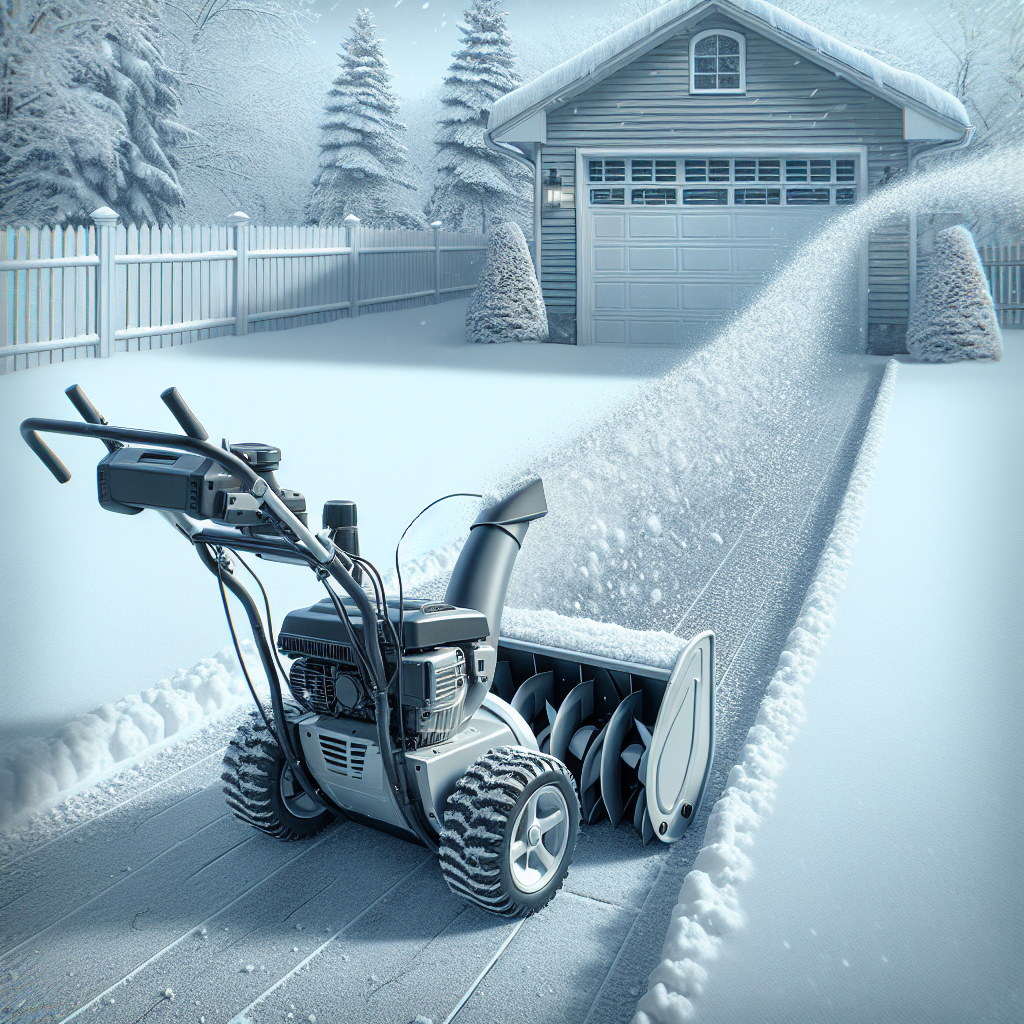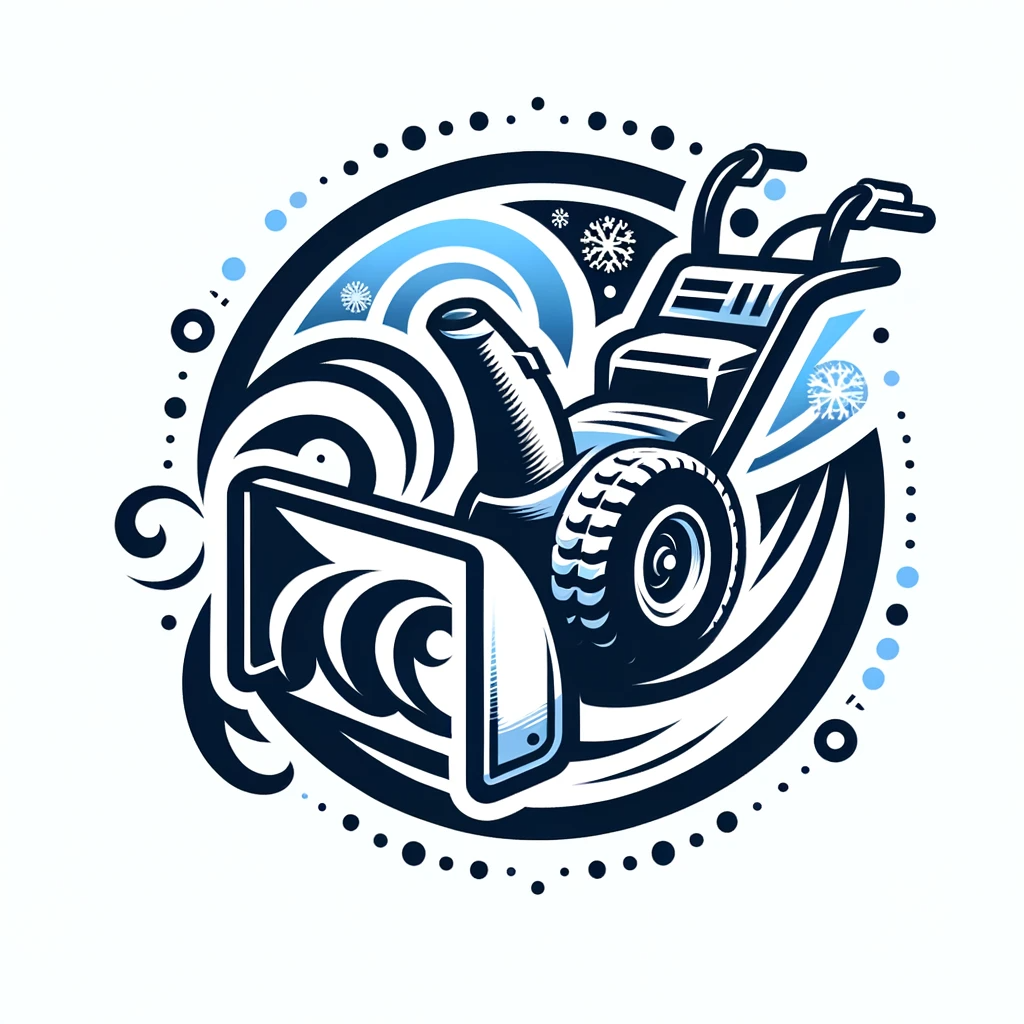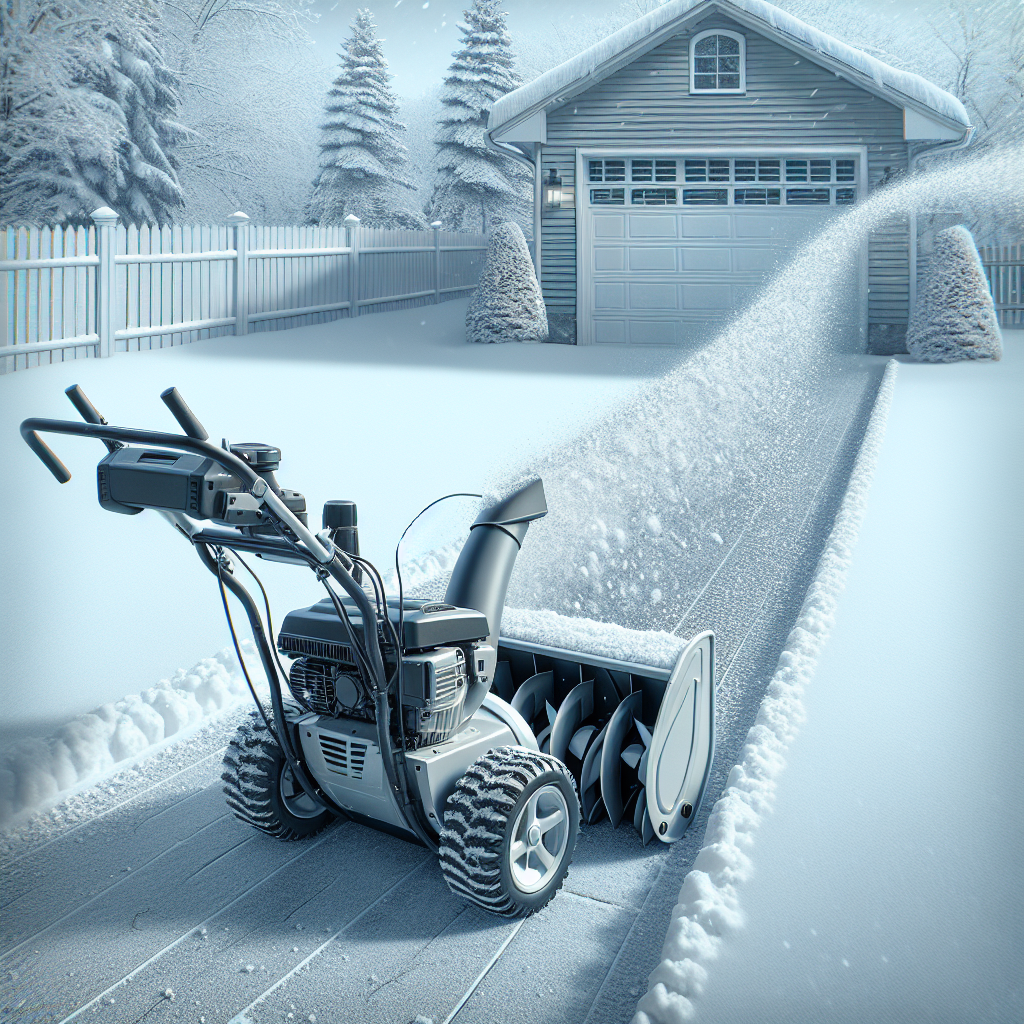As winter approaches and the first snowflakes start to fall, the thought of shoveling the driveway can be daunting. That’s where a snow blower comes to the rescue! But before you rush out to purchase one, you may find yourself wondering, “How much should I spend on a snow blower?” Well, fret not my friend, because we’ve got you covered. In this article, we’ll explore everything you need to know about finding the perfect snow blower that fits your budget and clears away your snowy woes. So grab a cup of hot cocoa and let’s get started!

Factors to Consider
Size of the Area
When choosing a snow blower, the size of the area you need to clear is an important factor to consider. If you have a small driveway or walkway, a compact and lightweight snow blower may be sufficient. However, if you have a large area to clear, you will need a more powerful snow blower that can handle heavy snow and cover a larger area in less time.
Type of Snow
The type of snow in your area can also impact your decision. If you typically experience light, fluffy snow, a single-stage snow blower may be suitable. These snow blowers are designed to handle smaller amounts of snow and are more maneuverable. However, if you often deal with heavy, wet snow, a two-stage or three-stage snow blower would be more appropriate as they can handle larger volumes and break through packed snow more effectively.
Frequency of Use
Consider how often you will be using the snow blower. If you live in an area with frequent and heavy snowfall, investing in a high-quality, durable snow blower is essential. On the other hand, if you only expect occasional snowfall, a more affordable option may suffice.
Personal Preferences
Your personal preferences also play a role in selecting a snow blower. Some people may prefer electric models for their convenience, while others may prefer gas-powered ones for their power and versatility. Consider factors such as noise level, maintenance requirements, and ease of use to ensure that the snow blower you choose aligns with your preferences.
Types of Snow Blowers
Single-Stage Snow Blowers
Single-stage snow blowers are perfect for clearing light to moderate snowfall on smaller areas. They are typically more affordable and compact, making them ideal for homeowners with limited storage space. These snow blowers use an auger to gather and throw the snow in a single motion. However, they may struggle with heavy or densely packed snow, and their clearing width is generally narrower than that of two-stage or three-stage models.
Two-Stage Snow Blowers
Two-stage snow blowers are designed to handle larger volumes of snow and more challenging conditions. They feature an auger to gather the snow and an impeller to throw it out through a discharge chute. These snow blowers are more powerful and can break through packed snow and ice more effectively. They also have wider clearing widths, making them suitable for clearing large driveways and areas. However, they tend to be larger and pricier compared to single-stage models.
Three-Stage Snow Blowers
Three-stage snow blowers are the most powerful and efficient snow blowers on the market. They are similar to two-stage models but with the addition of an accelerator that helps break up the snow and ice before it is thrown through the chute. These snow blowers are best suited for heavy snowfall areas and can handle large volumes of snow with ease. However, they are typically larger, more expensive, and may not be necessary for areas with lighter snowfall.
Budget Categories
Low-Range Snow Blowers
Low-range snow blowers are typically the most affordable options available. They are suitable for light snowfall and smaller areas. While they may not have all the bells and whistles of higher-end models, they can still effectively clear snow and provide good value for money.
Mid-Range Snow Blowers
Mid-range snow blowers offer a balance between affordability and performance. They are suitable for moderate snowfall and can handle larger areas. These snow blowers often come with more features and a higher level of durability compared to low-range models.
High-End Snow Blowers
High-end snow blowers are designed for heavy snowfall and large areas. They are built to withstand harsh conditions and provide superior performance and durability. These snow blowers usually come with advanced features and technologies, such as power steering and larger clearing widths. While they come at a higher price point, they are a worthwhile investment for those who experience frequent and heavy snowfall.
Additional Features
Electric Start
An electric start feature allows you to easily start the snow blower with the push of a button, eliminating the need for manual pulling of the recoil cord. This feature can be especially useful on cold winter mornings when starting a gas-powered snow blower may require more effort.
Headlight
A built-in headlight on a snow blower can improve visibility in low-light conditions, such as early mornings or evenings when it’s still dark. This feature can help you navigate and clear snow safely, especially when clearing snow in areas without exterior lighting.
Heated Handles
Heated handles provide added comfort during cold weather, ensuring that your hands stay warm while operating the snow blower. This feature can be particularly beneficial for those with sensitivity to the cold or for longer snow-clearing sessions.
Snowdrift Cutters
Snowdrift cutters are extensions attached to the snow blower’s auger housing. They are designed to break up and cut through dense snow and ice formations, allowing the snow blower to clear the snow more effectively. This feature is especially useful for areas prone to heavy snowdrifts.
Self-Propulsion
Self-propulsion allows the snow blower to move forward without requiring much effort from the operator. This feature is particularly advantageous for larger and more powerful snow blowers, as it reduces the strain on the user and makes clearing snow faster and easier.
Warranty and Customer Support
Manufacturer’s Warranty
When purchasing a snow blower, it is essential to consider the manufacturer’s warranty. A reliable warranty provides peace of mind, as it covers any defects in materials or workmanship that may arise during a specified period. It is advisable to choose a snow blower with a generous warranty, as it reflects the manufacturer’s confidence in the product’s quality.
Extended Warranty
Some retailers or manufacturers offer extended warranties for an additional cost. These extended warranties can provide extra coverage beyond the standard warranty period. While they can be beneficial in certain cases, it is essential to carefully assess the terms and conditions of the extended warranty before making a decision.
Availability of Customer Support
Consider the availability and quality of customer support offered by the manufacturer. It is essential to choose a snow blower from a company that is known for providing excellent customer service. Having reliable customer support can be valuable in case you encounter any issues or have questions regarding the operation or maintenance of your snow blower.
Factors Affecting Price
Brand Reputation and Quality
The reputation and quality of the brand play a significant role in the price of a snow blower. Established and reputable brands often invest in research, development, and rigorous testing, resulting in higher-quality products. While these snow blowers may come at a higher price, they typically offer superior performance, durability, and reliability.
Size and Power
The size and power of a snow blower can also affect its price. Larger snow blowers with higher horsepower engines tend to be more expensive due to their increased capability and performance. However, it is crucial to choose a size and power level that aligns with your specific needs, as oversized snow blowers may be unnecessary and costlier.
Additional Features
The inclusion of additional features can significantly impact the price of a snow blower. Higher-priced models often come with advanced features such as power steering, larger clearing widths, and enhanced user comfort features. Consider whether these additional features are essential for your snow clearing needs and budget before making a purchase.
Where to Buy
Local Retail Stores
Local retail stores, such as home improvement centers or specialized outdoor equipment stores, often carry a range of snow blowers. Visiting these stores allows you to see the snow blowers in person, compare different models, and get expert advice from sales representatives. Additionally, local stores may offer services such as assembly assistance and maintenance support.
Online Retailers
Online retailers provide the convenience of shopping from the comfort of your own home. They often offer a wide variety of snow blowers, allowing you to compare different models, read customer reviews, and access detailed specifications. However, it is important to research the reputation and reliability of the online retailer before making a purchase, ensuring they offer secure transactions and reliable shipping services.
Directly from Manufacturers
Some snow blower manufacturers have their own websites or authorized dealerships where you can purchase their products directly. Buying from the manufacturer or their authorized dealers ensures that you are getting a genuine product and can provide access to exclusive deals, promotions, and customer support directly from the source.
Research and Comparison
Reading Reviews
Before purchasing a snow blower, it is beneficial to read reviews from other customers who have already used the product. Reviews can provide valuable insights into the snow blower’s performance, durability, and any potential issues or limitations. Look for reputable sources, such as independent consumer review websites or online retailers with verified customer reviews, to gather a well-rounded understanding of the snow blower you are considering.
Comparing Specifications
Comparing the specifications of different snow blowers can help you make an informed decision. Consider factors such as clearing width, clearing depth, engine power, and additional features. Assess which specifications are essential for your needs and prioritize accordingly. By comparing the specifications side by side, you can determine which snow blower offers the best combination of features and performance for your budget.
Seeking Recommendations
If you are unsure about which snow blower to choose, seeking recommendations from friends, family, or neighbors who have experience with snow blowers can be helpful. They can provide valuable insights and firsthand experiences, helping you make a more informed decision. Additionally, consider joining online forums or social media groups dedicated to snow removal, where you can ask for recommendations and advice from a broader community.
Making the Decision
Setting a Budget
Before purchasing a snow blower, it is essential to set a budget. Determine how much you are willing to spend based on your individual financial situation and the value you place on the features and performance of the snow blower. Having a set budget will help narrow down your options and ensure that you make a financially responsible decision.
Evaluating Needs and Preferences
Based on the factors discussed earlier, evaluate your specific needs and preferences. Consider the size of the area you need to clear, the type of snow you typically experience, and how frequently you will use the snow blower. Take into account your personal preferences regarding features, such as electric start or heated handles, to ensure that the snow blower you choose aligns with your requirements.
Consider Long-Term Costs
When evaluating different snow blowers, it is important to consider not only the upfront cost but also the long-term costs associated with maintenance and operation. Evaluate factors such as fuel efficiency, maintenance requirements, and availability and cost of replacement parts. Choosing a snow blower that is cost-effective to operate and maintain in the long run will save you money and ensure its longevity.
Maintaining Your Snow Blower
Regular Maintenance Schedule
To keep your snow blower in optimal condition, it is important to adhere to a regular maintenance schedule. This includes tasks such as checking and replacing the engine oil, inspecting the spark plug, adjusting belts and cables, and cleaning the machine after each use. Following the manufacturer’s guidelines for maintenance will ensure that your snow blower operates efficiently and lasts for many winters to come.
Cleaning and Storage Tips
Properly cleaning and storing your snow blower during the offseason is crucial for its longevity. Before storing, remove any remaining fuel from the tank and run the engine until it stops to prevent fuel-related issues. Clean the auger, chute, and other components of the snow blower to remove any debris or moisture. Store the snow blower in a cool, dry place, preferably covered, to protect it from the elements.
Professional Servicing
If you are not comfortable performing maintenance tasks on your snow blower, it is advisable to seek professional servicing on a regular basis. Professional technicians can inspect and service your snow blower, ensuring that it is in proper working condition. They can also address any issues or repairs that are beyond your capabilities, extending the lifespan of your snow blower. Regular servicing can provide peace of mind and help prevent unexpected breakdowns.
In conclusion, choosing the right snow blower requires careful consideration of factors such as the size of the area, type of snow, frequency of use, and personal preferences. Understanding the different types of snow blowers, budget categories, and additional features available will allow you to make an informed decision. Researching and comparing specifications, reading reviews, and seeking recommendations can provide valuable insights. Once you have made a decision, proper maintenance and storage will ensure that your snow blower remains in optimal condition for years to come.

